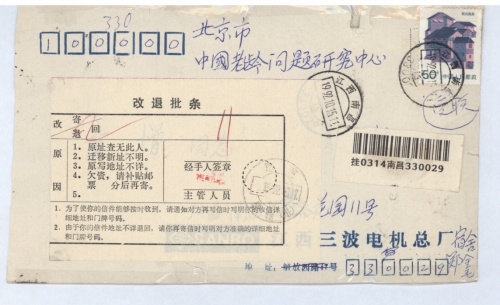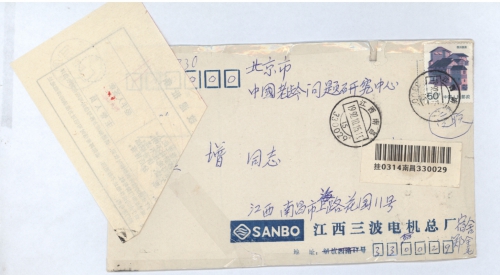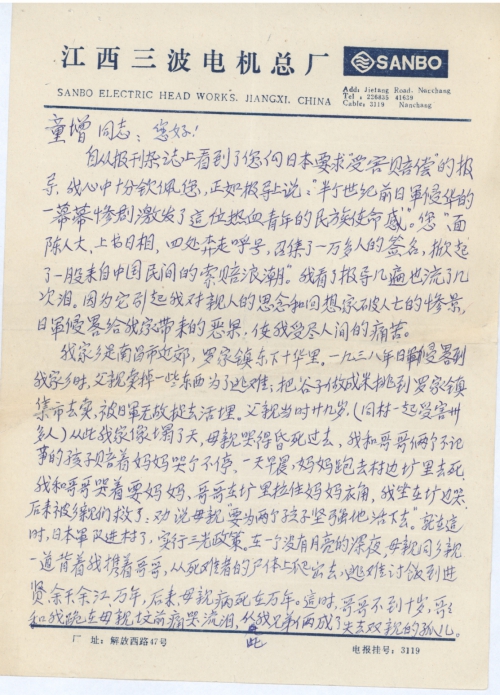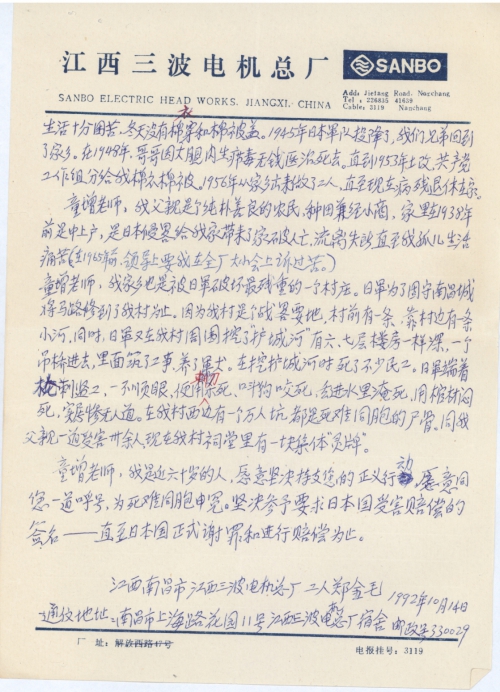Date of letter:1992-10-14
Address of author:Nanchang City, Jiangxi Province
Date of event:1938
Location of event:Nanchang City, Jiangxi Province
Name of author:Zheng Jinmao
Name(s) of victim(s):Zheng Jinmao’s father and fellow citizensType of atrocity:Murders, Slave Laborers, Others(MU, SL, OT)
Other details:My family lived in the suburbs of Nanchang City. In 1938, the Japanese agressors invaded my hometown. Before heading for a refuge, my father traded some things for money. After that, however, he was caught by the Japanese soldiers for no reason and was buried alive. My mother almost collapsed at the news, but she had to be strong and survive the difficulties with my elder brother and me. In order to occupy Nanchang permanently, the Japanese soldiers forced civilian workers to build roads and dig a moat, from which many workers died. With guns and bayonets, the Japanese soldiers would stab anyone incurring dislike to death or have him bit to death by dogs, or throw him into the water drowned. In our village, there was a “mass graves” full of the bodies of the victims. I would like to support Mr. Tong’s justice action in redressing injustice for the victims.
Comrade Tong Zeng,
I admire you so much after reading an article from the newspaper and magazine about you demanding damage compensation from Japan. According to the article, “Tragic incidents that happened half a century ago during Japan’s invasion of China brought about the sense of national mission from this enthusiastic young man.” You “submitted a proposal to the National People’s Congress, wrote a letter to the Japanese Prime Minister, went to many places to gather information, collected the signatures of over 10,000 people and created a wave of civil claims in China”. I read the article several times and cried each time because it made me miss my relatives and brought back my memories of how my family was torn apart and the suffering that the invading Japanese army brought to my family and me.
My hometown is located in the suburb of Nanchang City, 10 li (1 li=500 meters) to the east of Luojia Town. When the Japanese army invaded my hometown in 1938, my father decided to sell something to make some money so that we could escape from our hometown. So he made millet into rice and carried it to the fair in Luojia Town to sell it. But he was captured by the Japanese army for no reason and buried alive. My father was then 29 (over 30 villagers died too). After his death, my family collapsed. My mother cried her heart out; my older brother and I, two innocent children, cried with her. One morning, my mother ran to the cemetery near the village, intending to commit suicide. My older brother and I followed her, crying all the way. My older brother firmly pulled my mother’s clothes in the cemetery and I could do nothing but cry. Later, other villagers came and persuaded my mother by saying, “You must be strong for the two kids.” After that, the Japanese army entered the village and implemented the Three Alls policy. At a deep night without moonlight, my mother, carrying me and holding the hand of my older brother, climbed out of our village by passing the corpses of victims with other villagers. We fled to Jinxian, Yugan, Yujiang and Wannian, begging all the way. Later, my mother died of illness in Wannian. My older brother, who was then less than 10, and I knelt before my mother’s tomb and cried bitterly. Thus, we became orphans without parents. Life was very difficult for us. In winter, we didn’t have cotton clothes or quilts. After Japan surrendered in 1945, we returned to our hometown. In 1948, my older brother got boils in his thighs and died due to lack of money for treatment. It wasn’t until 1953 when the land reform was introduced that the Work Group of the Communist Party distributed cotton clothes and quilts to me. In 1956, I left my hometown and became a worker. Now, I have retired due to illness.
Teacher Tong Zeng, my father was a simple, kind farmer who made a living by farming and doing small businesses and my family lived a relatively well-off life before 1938. It was Japan’s invasion of China that tore my family apart, caused me homeless and made me lead a painful life as an orphan. (Before 1965, I share my painful experience in big or small meetings of our factory as requested by my leaders.)
Teacher Tong Zeng, my hometown is one of the villages that have suffered most damage from the Japanese army. To consolidate their occupation of Nanchang, the Japanese army built a road to our village, making our village a key strategic place. As there was a river flowing before and by the side of my village, the Japanese army decided to dig a moat to surround my village. First, a ditch as deep as a 6-or7-storey building was dug. Inside the ditch was a suspension bridge, workers and military dogs that were kept by the Japanese army. Quite a number of workers died digging the river. The Japanese soldiers, armed with bayonets and guns, supervised them and if they were not satisfied with any worker, they would bayonet him to death, or let the dog bite him to death, or drown him by throwing him into the river or suffocate him to death by leaving him in a coffin. How cruel was that! There is a Ten Thousand People Pit in the west of my village, where the corpses of compatriots are kept. There is a collective “Memorial Tablet” in the memorial hall of my village commemorating the death of my father and other over 30 people.
Teacher Tong Zeng, as a man of nearly 60, I firmly support your righteous act and I am willing to pursue justice for dead compatriots with you. I am determined to join your signature campaign demanding damage compensation from Japan and will work with you until Japan formally apologizes to and compensates the Chinese people.
Worker of Jiangxi Sanbo Electric Motor Factory, Nanchang City, Jiangxi Province
Zheng Jinmao
October 14, 1992
Address: Dormitory, Jiangxi Sanbo Electric Motor Factory, No. 11, Garden, Shanghai Road, Nanchang City.
Postal code: 330029

















